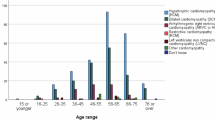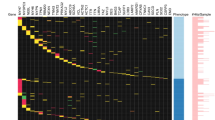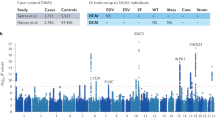Abstract
Hypertrophic cardiomyopathy is a common autosomal dominant disease, associated with heart failure and arrhythmias predisposing to sudden cardiac death. After the detection of the causal mutation in the proband predictive DNA testing of relatives is possible (cascade screening). Prevention of sudden cardiac death in patients with a high risk by means of an implantable cardioverter defibrillator is effective. In 97 hypertrophic cardiomyopathy families with a sarcomere gene mutation we retrospectively determined uptake of genetic counselling and predictive DNA testing in relatives within 1 year after the detection of the causal mutation in the proband. Uptake of genetic counselling was 39% and did not differ significantly by proband's or relative's gender, nor by young age of the relative (<18 years) or a family history positive for sudden cardiac death. In second-degree relatives, eligible for predictive DNA testing when the first-degree relative had died, uptake was 27.5% (P=0.047). Uptake of predictive genetic testing was 39%; conditional uptake of predictive genetic testing was 99%. Uptake of genetic counselling in hypertrophic cardiomyopathy is comparable to uptake in oncogenetics. Conditional uptake of predictive DNA testing, however, is much higher. Because sudden cardiac death can be prevented uptake of genetic counselling in hypertrophic cardiomyopathy should be as high as possible. To achieve this research into the determinants of uptake is needed.
Similar content being viewed by others
Log in or create a free account to read this content
Gain free access to this article, as well as selected content from this journal and more on nature.com
or
References
Maron BJ, Gardin JM, Flack JM, Gidding SS, Kurosaki TT, Bild DE : Prevalence of hypertrophic cardiomyopathy in a general population of young adults. Echocardiographic analysis of 4111 subjects in the CARDIA Study. Coronary artery risk development in (young) adults. Circulation 1995; 92: 785–789.
Morita H, Larson MG, Barr SC et al: Single-gene mutations and increased left ventricular wall thickness in the community: the Framingham Heart Study. Circulation 2006; 113: 2697–2705.
Zou Y, Song L, Wang Z et al: Prevalence of idiopathic hypertrophic cardiomyopathy in China: a population-based echocardiographic analysis of 8080 adults. Am J Med 2004; 116: 14–18.
Maron BJ : Hypertrophic cardiomyopathy: a systematic review. JAMA 2002; 287: 1308–1320.
Cannan CR, Reeder GS, Bailey KR, Melton III LJ, Gersh BJ : Natural history of hypertrophic cardiomyopathy. A population-based study, 1976 through 1990. Circulation 1995; 92: 2488–2495.
Maron BJ, Olivotto I, Spirito P et al: Epidemiology of hypertrophic cardiomyopathy-related death: revisited in a large non-referral-based patient population. Circulation 2000; 102: 858–864.
de Vreede-Swagemakers JJ, Gorgels AP, Dubois-Arbouw WI et al: Out-of-hospital cardiac arrest in the 1990's: a population-based study in the Maastricht area on incidence, characteristics and survival. J Am Coll Cardiol 1997; 30: 1500–1505.
Girolami F, Olivotto I, Passerini I et al: A molecular screening strategy based on beta-myosin heavy chain, cardiac myosin binding protein C and troponin T genes in Italian patients with hypertrophic cardiomyopathy. J Cardiovasc Med (Hagerstown) 2006; 7: 601–607.
Richard P, Charron P, Carrier L et al: Hypertrophic cardiomyopathy: distribution of disease genes, spectrum of mutations, and implications for a molecular diagnosis strategy. Circulation 2003; 107: 2227–2232.
Alders M, Jongbloed R, Deelen W et al: The 2373insG mutation in the MYBPC3 gene is a founder mutation, which accounts for nearly one-fourth of the HCM cases in the Netherlands. Eur Heart J 2003; 24: 1848–1853.
Elliott PM, Poloniecki J, Dickie S et al: Sudden death in hypertrophic cardiomyopathy: identification of high risk patients. J Am Coll Cardiol 2000; 36: 2212–2218.
Elliott PM, Gimeno JR, Tome MT et al: Left ventricular outflow tract obstruction and sudden death risk in patients with hypertrophic cardiomyopathy. Eur Heart J 2006; 27: 1933–1941.
Kofflard MJ, Ten Cate FJ, van der Lee C, van Domburg RT : Hypertrophic cardiomyopathy in a large community-based population: clinical outcome and identification of risk factors for sudden cardiac death and clinical deterioration. J Am Coll Cardiol 2003; 41: 987–993.
Niimura H, Bachinski LL, Sangwatanaroj S et al: Mutations in the gene for cardiac myosin-binding protein C and late-onset familial hypertrophic cardiomyopathy. N Engl J Med 1998; 338: 1248–1257.
Maron BJ, McKenna WJ, Danielson GK et al: American College of Cardiology/European Society of Cardiology clinical expert consensus document on hypertrophic cardiomyopathy. A report of the American College of Cardiology Foundation Task Force on Clinical Expert Consensus Documents and the European Society of Cardiology Committee for Practice Guidelines. J Am Coll Cardiol 2003; 42: 1687–1713.
Maron BJ, Estes III NA, Maron MS, Almquist AK, Link MS, Udelson JE : Primary prevention of sudden death as a novel treatment strategy in hypertrophic cardiomyopathy. Circulation 2003; 107: 2872–2875.
Maron BJ, Spirito P, Shen WK et al: Implantable cardioverter-defibrillators and prevention of sudden cardiac death in hypertrophic cardiomyopathy. JAMA 2007; 298: 405–412.
Marteau TM, Kinmonth AL : Screening for cardiovascular risk: public health imperative or matter for individual informed choice? BMJ 2002; 325: 78–80.
van Langen I, Hofman N, Tan HL, Wilde AA : Family and population strategies for screening and counselling of inherited cardiac arrhythmias. Ann Med 2004; 36 (Suppl 1): 116–124.
ASHG statement: Professional disclosure of familial genetic information. The American Society of Human Genetics Social Issues Subcommittee on Familial Disclosure. Am J Hum Genet 1998; 62: 474–483.
Hermans J, Christiaans I, van Tintelen J, Wilde A, Pinto Y : GENCOR: a national registry for patients and families suffering from a familial heart disease in the Netherlands. Neth Heart J 2006; 14: 274–278.
Aktan-Collan K, Mecklin JP, Jarvinen H et al: Predictive genetic testing for hereditary non-polyposis colorectal cancer: uptake and long-term satisfaction. Int J Cancer 2000; 89: 44–50.
Brooks L, Lennard F, Shenton A et al: BRCA1/2 predictive testing: a study of uptake in two centres. Eur J Hum Genet 2004; 12: 654–662.
Codori AM, Petersen GM, Miglioretti DL et al: Attitudes toward colon cancer gene testing: factors predicting test uptake. Cancer Epidemiol Biomarkers Prev 1999; 8: 345–351.
Lerman C, Hughes C, Trock BJ et al: Genetic testing in families with hereditary nonpolyposis colon cancer. JAMA 1999; 281: 1618–1622.
Suthers GK, Armstrong J, McCormack J, Trott D : Letting the family know: balancing ethics and effectiveness when notifying relatives about genetic testing for a familial disorder. J Med Genet 2006; 43: 665–670.
Hadley DW, Jenkins J, Dimond E et al: Genetic counseling and testing in families with hereditary nonpolyposis colorectal cancer. Arch Intern Med 2003; 163: 573–582.
Kerzin-Storrar L, Wright C, Williamson PR et al: Comparison of genetic services with and without genetic registers: access and attitudes to genetic counselling services among relatives of genetic clinic patients. J Med Genet 2002; 39: 85e.
Charron P, Heron D, Gargiulo M et al: Genetic testing and genetic counselling in hypertrophic cardiomyopathy: the French experience. J Med Genet 2002; 39: 741–746.
van Maarle MC, Stouthard ME, Marang-van de Mheen PJ, Klazinga NS, Bonsel GJ : How disturbing is it to be approached for a genetic cascade screening programme for familial hypercholesterolaemia? Psychological impact and screenees′ views. Community Genet 2001; 4: 244–252.
Wright C, Kerzin-Storrar L, Williamson PR et al: Comparison of genetic services with and without genetic registers: knowledge, adjustment, and attitudes about genetic counselling among probands referred to three genetic clinics. J Med Genet 2002; 39: 84e.
Andersen RM : Revisiting the behavioral model and access to medical care: does it matter? J Health Soc Behav 1995; 36: 1–10.
Biesecker BB, Ishibe N, Hadley DW et al: Psychosocial factors predicting BRCA1/BRCA2 testing decisions in members of hereditary breast and ovarian cancer families. Am J Med Genet 2000; 93: 257–263.
Foster C, Evans DG, Eeles R et al: Predictive testing for BRCA1/2: attributes, risk perception and management in a multi-centre clinical cohort. Br J Cancer 2002; 86: 1209–1216.
Brain K, Sivell S, Bennert K et al: An exploratory comparison of genetic counselling protocols for HNPCC predictive testing. Clin Genet 2005; 68: 255–261.
Gaff CL, Clarke AJ, Atkinson P et al: Process and outcome in communication of genetic information within families: a systematic review. Eur J Hum Genet 2007; 15: 999–1011.
Newson AJ, Humphries SE : Cascade testing in familial hypercholesterolaemia: how should family members be contacted? Eur J Hum Genet 2005; 13: 401–408.
Acknowledgements
Clinical data of the HCM families in this study are lodged in the GENCOR database (www.gencor.nl), a national database for familial heart diseases, supported by the Interuniversity Cardiology Institute of the Netherlands. This research is financially supported by ZorgOnderzoek Nederland (ZonMw), grant number 62000010. The funding organisation has had no involvement in study design, collection, analysis and interpretation of data; in the writing of this paper and in the decision to submit the paper for publication. There are no actual or potential conflicts of interest for all authors.
Author information
Authors and Affiliations
Corresponding author
Rights and permissions
About this article
Cite this article
Christiaans, I., Birnie, E., Bonsel, G. et al. Uptake of genetic counselling and predictive DNA testing in hypertrophic cardiomyopathy. Eur J Hum Genet 16, 1201–1207 (2008). https://doi.org/10.1038/ejhg.2008.92
Received:
Revised:
Accepted:
Published:
Issue date:
DOI: https://doi.org/10.1038/ejhg.2008.92
Keywords
This article is cited by
-
Community concerns about genetic discrimination in life insurance persist in Australia: A survey of consumers offered genetic testing
European Journal of Human Genetics (2024)
-
Cascade genetic counseling and testing in hereditary syndromes: inherited cardiovascular disease as a model: a narrative review
Familial Cancer (2024)
-
A tailored approach to informing relatives at risk of inherited cardiac conditions: results of a randomised controlled trial
European Journal of Human Genetics (2022)
-
Study protocol: the Australian genetics and life insurance moratorium—monitoring the effectiveness and response (A-GLIMMER) project
BMC Medical Ethics (2021)
-
Uptake and predictors of colonoscopy use in family members not participating in cascade genetic testing for Lynch syndrome
Scientific Reports (2020)



